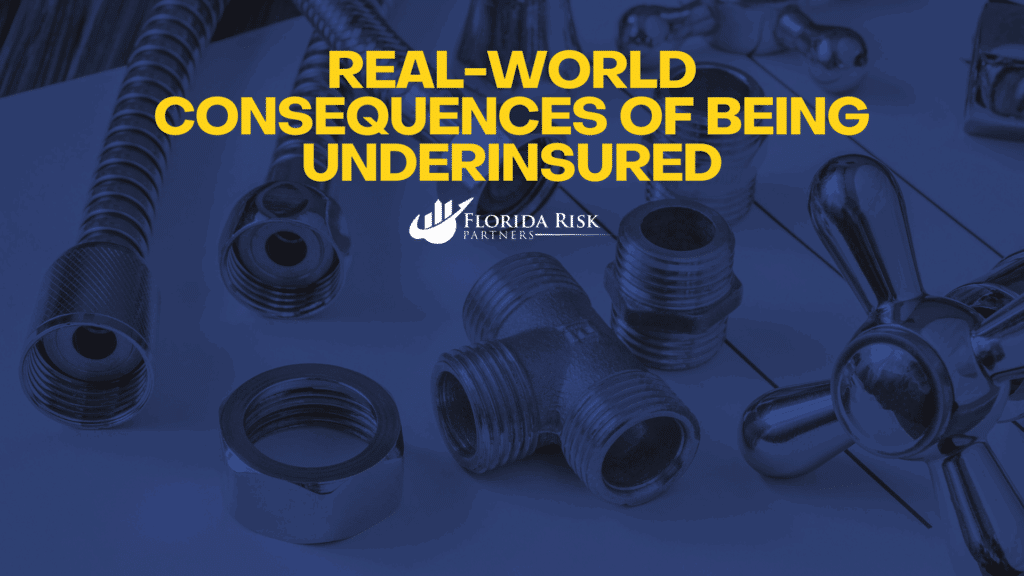-
Main Office: 1434 E. Bloomingdale Ave Valrico, FL 33596-6110
-
Phone: (888) 601-6660
-
Email: info@floridariskpartners.com

Starting and operating a plumbing business in Florida can be a profitable and rewarding endeavor, but only if you have your compliance house in order. With the state’s complex regulatory landscape and high exposure to liability risks, Florida plumbing contractors must be properly licensed and insured to protect their business, their employees, and their clients. In this post, we’ll break down the essential Florida plumbing contractor license requirements, explore the insurance coverages needed to stay compliant, and discuss how working with the right insurance agent can keep you both protected and positioned for growth.
Whether you’re just getting started or you’ve been operating for years, this guide will help you avoid the costly pitfalls that can arise from being underinsured or out of compliance in the Sunshine State.
Why Licensing Matters for Florida Plumbing Contractors
Florida is one of the more heavily regulated states when it comes to construction and skilled trades. Plumbing contractors must be licensed through the Florida Department of Business and Professional Regulation (DBPR) and meet a specific set of criteria before they are legally permitted to perform plumbing work.
There are two main types of plumbing contractor licenses in Florida:
- Certified Contractor License: Allows you to work anywhere in the state.
- Registered Contractor License: Limits your work to specific local jurisdictions where you’ve met their requirements.
Regardless of which license you hold, you’ll need to meet education and experience requirements, pass state examinations, and—critically—carry minimum insurance coverages before your license can be approved.
Florida Plumbing Contractor Insurance Requirements
To obtain and maintain a plumbing contractor license in Florida, contractors must show proof of specific insurance coverage. This is not optional—it is a legal requirement enforced by the DBPR and other local regulatory bodies. The required coverages help protect the public, employees, and the contractor’s own business from major risks associated with plumbing work.
Minimum General Liability Insurance Requirements
Florida requires plumbing contractors to carry general liability insurance to protect against third-party claims of bodily injury, property damage, and legal defense costs.
The minimum required limits are:
- $100,000 in general liability coverage per occurrence
- $25,000 in property damage liability coverage
However, these limits are truly the bare minimum and may not be sufficient depending on the size and scope of your operations. For plumbing contractors working in high-end residential areas, multi-family units, or commercial spaces, higher limits are strongly recommended—and in many cases, required by clients or general contractors.

Workers’ Compensation Insurance: Non-Negotiable for Plumbers
In Florida, plumbing contractors are classified under the construction industry, which means that even one part-time employee triggers a legal requirement to carry workers’ compensation insurance.
Workers’ compensation insurance pays for medical bills, lost wages, and rehabilitation costs if an employee is injured on the job. It also protects the employer from lawsuits related to the injury.
Failing to carry workers’ comp can lead to:
- Hefty fines from the Florida Division of Workers’ Compensation
- Potential stop-work orders
- Lawsuits if an employee is injured and coverage isn’t in place
This is a critical area where many contractors get tripped up—thinking that they can classify workers as “independent contractors” or use subcontractors without considering the downstream insurance implications. An experienced insurance agent can help you navigate these classifications and ensure you’re properly covered.
Other Recommended Insurance Coverages for Florida Plumbing Companies
While general liability and workers’ compensation are required, there are several additional policies that can protect your plumbing business from significant financial loss. These policies may not be mandatory for licensing, but they are highly recommended:
Commercial Auto Insurance
If your plumbing business owns vans or trucks used for transporting workers, tools, and materials, you’ll need commercial auto insurance. Florida law requires minimum liability limits, but most businesses need broader protection, including:
- Liability for accidents
- Collision and comprehensive coverage
- Hired/non-owned auto coverage (for vehicles not owned by the company but used for business purposes)
Inland Marine (Tools and Equipment Coverage)
Your tools are your livelihood. An inland marine policy protects your plumbing tools and equipment from theft, loss, or damage while on the move or at job sites.
Umbrella Liability Insurance
This provides an additional layer of liability protection above and beyond the limits of your general liability, auto, or workers’ comp policies. It can be crucial in Florida, where lawsuits often result in large verdicts or settlements.
Professional Liability Insurance (E&O)
While not common for all plumbing contractors, those involved in design-build projects or consulting should consider professional liability (also known as errors and omissions insurance) to protect against claims of negligence that result in financial loss.
Why Florida Plumbing Companies Need an Insurance Partner – Not Just a Policy
Having the right coverage in place is not just about ticking a box on your license application—it’s about protecting your business long-term.
Too often, Florida plumbing contractors purchase cheap policies online or through agents who don’t specialize in the construction trades. As a result, they end up with:
- Coverage exclusions that leave them exposed
- Incorrect classifications that increase premiums
- Insufficient limits to meet contract requirements
- Lapses in coverage due to misunderstanding payment schedules
An insurance partner who understands the plumbing industry in Florida can provide more than just a policy—they offer risk management insights, claims support, and proactive guidance as your business grows.
Real-World Consequences of Being Underinsured

To drive the point home, here are a few real-world claim examples we’ve seen among Florida plumbing contractors:
Example 1: The Water Damage Lawsuit
A plumber in Tampa was called to install a new water heater in a high-rise condo. During installation, a small leak went unnoticed for hours, flooding three units below. The general liability policy had a $100,000 limit, but total damages exceeded $300,000. Without an umbrella policy, the contractor had to pay the difference out-of-pocket.
Example 2: The Uninsured Worker Injury
A small plumbing business in Miami used a part-time worker for a few weeks without purchasing workers’ comp. The worker fell off a ladder and suffered a back injury requiring surgery. The company was fined over $20,000 and sued for damages exceeding $75,000.
Example 3: Tools Stolen from Van Overnight
A contractor in Orlando had over $15,000 in tools stolen from a locked van parked outside a job site. The general liability and commercial auto policies did not cover the loss. The business owner had to delay projects and repurchase all equipment—something that could have been avoided with an inland marine policy.
How to Get Licensed and Insured as a Florida Plumbing Contractor
Here’s a step-by-step overview for those getting started:
Step 1: Apply for Your License
Submit your application through the Florida DBPR, including:
- Proof of experience (4 years, with at least 1 as a foreman)
- Credit report and background check
- Passing scores on trade and business exams
- Financial responsibility documentation
Step 2: Obtain the Required Insurance
Work with a licensed commercial insurance agent to:
- Get a general liability policy with at least $100K/$25K limits
- Secure workers’ comp if you have any employees
- Discuss additional coverages based on your operations
Step 3: Submit Proof of Coverage to the DBPR
Ensure certificates of insurance (COIs) list the correct entity names and meet the DBPR’s formatting requirements. Your agent can handle this for you and communicate directly with the state to avoid delays.
Step 4: Maintain Coverage Annually
Set calendar reminders to review and renew your policies on time. Let your insurance agent know if you’re expanding operations, hiring more staff, or bidding larger jobs—they can update your coverage accordingly.
Final Thoughts: Protecting Your Florida Plumbing Business Starts with the Right Insurance
The Florida plumbing contractor license requirements are designed to protect not only consumers, but also the long-term success of your business. By meeting (and ideally exceeding) the insurance needed for a plumbing license in Florida, you’re giving your company a solid legal and financial foundation.
If you’re unsure whether your current policies meet Florida’s standards—or if you’re just getting started and want guidance—our team specializes in helping plumbing contractors build custom insurance and risk management programs that go beyond the minimum. Let us be the partner that protects your business while you focus on growing it.
Get a Free Insurance Review Today
Ready to make sure your plumbing business is fully protected and compliant? Click here to schedule your free consultation.
Call Us Or
Schedule an Appointment
Select an agent below to view our online calendars and select a day and time that works best for you or call us directly at 888-601-6660. When you use our online calendars, you will receive an email with more information.



